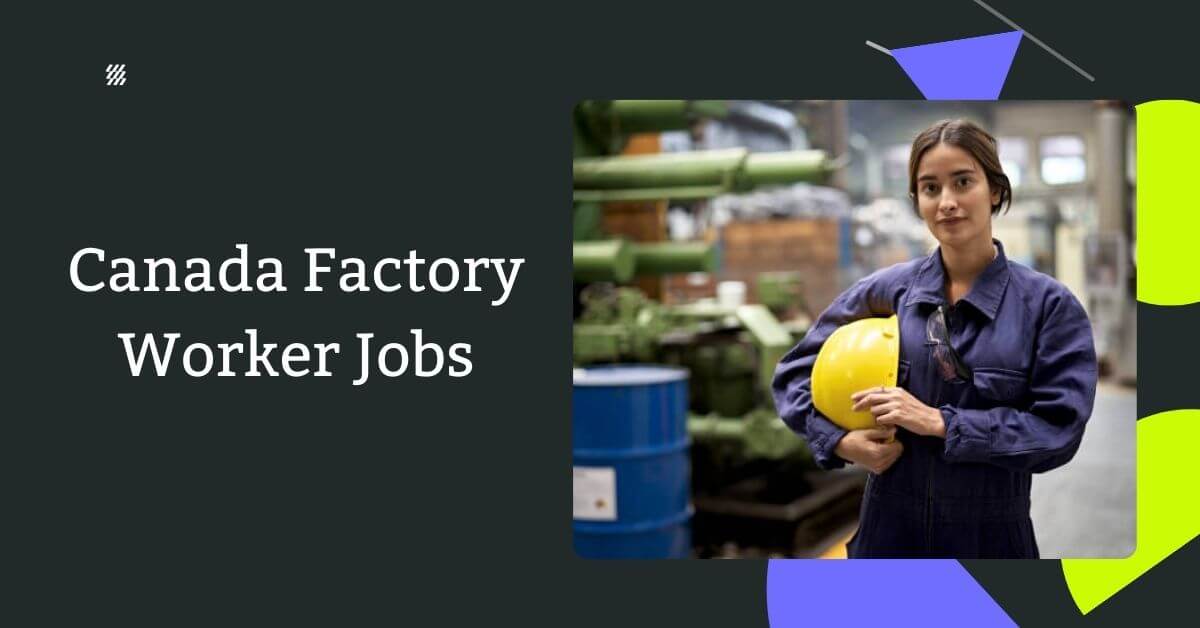In 2025, Canada continues to offer numerous opportunities for foreign workers seeking factory positions with Labour Market Impact Assessment (LMIA) sponsorship. These roles are essential in sectors such as manufacturing, food processing, and logistics, where there is a consistent demand for labor.
Check If You Qualify:
Before you look for a job, you should check to see if you meet the following standards for factory worker jobs in Canada:
- Language Skills: Knowing English or French is helpful, but many jobs as a factory worker don’t require direct language tests like the IELTS. Check out the job postings to see what language skills are needed.
- Education: Most of the time, you should have at least a high school education.
- Fitness: Working in a factory can be hard on your body, so you need to be strong and fit.
- Job Experience: Some employers look for experience, but many don’t need you to have worked before.
- Legal Requirements: Check to see if you are legally allowed to work in Canada by looking at the country’s labor rules.
Find Job Openings:
Check out the Canadian Job Bank website to see what plant worker jobs are available. There are many job names to choose from, such as Factory Helper, Laborer, Packaging Worker, Manufacturing Worker, and more.
Check Job Listings:
Read through the job postings and choose the ones that fit your skills and interests. Take notes on things like where the job is located, how much it pays, and whether it’s full-time or part-time.
Apply for Canada Factory Worker Jobs:
Once you’ve found jobs that fit your needs, click on each one to see how to apply. Do what the employer says, which generally means sending your resume and cover letter.
Benefits of Canada Factory Worker Jobs:
- Procurement of Employment Opportunities: Opportunities exist for individuals with diverse skill sets and levels of education to obtain factory worker positions, including those who are new to the workforce or in search of employment without advanced credentials.
- Consistent Employment: Numerous factory positions provide consistent and stable employment. Factories frequently adhere to a consistent timetable, which affords employees a regimen of work and a consistent source of income.
- Curriculum and Skill Enhancement: Engaging in factory work can afford employees the opportunity to gain practical experience and cultivate specialized proficiencies in machinery operation, manufacturing processes, quality assurance, and safety protocols. For future career opportunities, these abilities may prove useful.
- Entry-Level Employment: Frequently, factory worker positions are entry-level, enabling individuals to gain professional experience without requiring a substantial degree or specialized training. Those who are just beginning their professional endeavors may find this useful.
- Work in Teams and Collaboration: Constantly, achieving production objectives in a factory requires cooperation with coworkers. A sense of camaraderie is fostered through this collaboration, which may also contribute to a positive work environment.
- Possibilities for Progress: Numerous manufacturing facilities provide employees with organized career trajectories that facilitate their progression within the establishment. The acquisition of new skills, diligence, and effort may result in advancements and increased responsibilities.
- Safety and Health Measures: Respectable manufacturing facilities place a premium on employee health and safety. This includes the implementation of safety protocols, the provision of training on the correct use of apparatus, and the maintenance of a regulatory-compliant work environment.
- Diverse Occupations: In addition to machine operators and assembly line workers, maintenance technicians and quality control inspectors occupy factory environments. This diversity permits individuals to investigate various manufacturing facets.
- Compensatory Competitiveness: Numerous factory positions provide competitive compensation, including benefits such as health insurance and retirement plans, in addition to hourly wages and overtime pay.
- Enhancement of Productivity: In the manufacturing of materials and products, factory employees perform an indispensable function. As part of a larger productive endeavor, contributing to the manufacturing process can provide a sense of accomplishment and pride.
Application Process:
Get Ready for Interviews:
If your application is accepted, get ready for interviews by learning about the company, practicing common interview questions, and making sure you know what the job standards are.
Receive LMIA:
The company will ask for a Labour Market Impact Assessment (LMIA) to show that hiring a foreign worker won’t hurt the Canadian job market if they decide to hire you. A lot of the time, the boss does this.
Apply for Work Permit:
You can apply for a work permit after getting a good LMIA. The LMIA tells you that you have a job offer in Canada.
Arrive in Canada:
Plan your trip to Canada and start your job as a factory worker as soon as your work permit is accepted.
Start Working:
Plan your trip to Canada and start your job as a factory worker as soon as your work permit is accepted.
Conclusion:
Being a factory worker in Canada is a safe and satisfying job. To find a job as a factory worker through the LMIA Job Bank, follow this guide and use the tools on the Canadian Job Bank. Good luck with your job search and your new job in Canada!
Frequently Asked Questions:
What is an LMIA
In order to show that hiring a foreign worker won’t hurt the Canadian job market, businesses must do an LMIA (Labour Market Impact Assessment). The worker can apply for a work permit based on the job offer once the company gets a positive LMIA.
What qualifications are required to work as a factory worker in Canada?
People who want to apply should be able to speak English or French, have at least a high school diploma, be physically fit, legally be able to work in Canada, and be able to meet the requirements mentioned in the job postings.
How much do factory workers get paid in Canada?
The average factory worker’s salary in Canada is $33,150 per year or $17 per hour.






